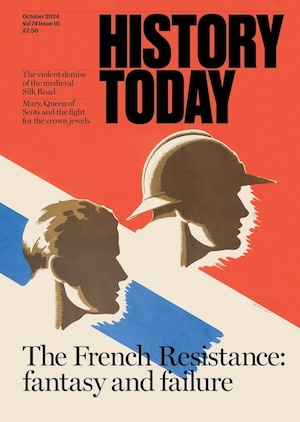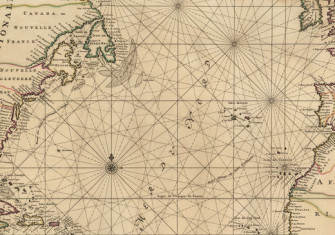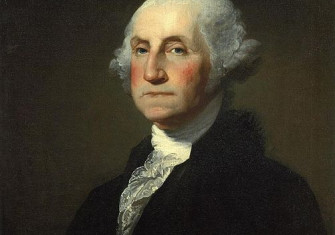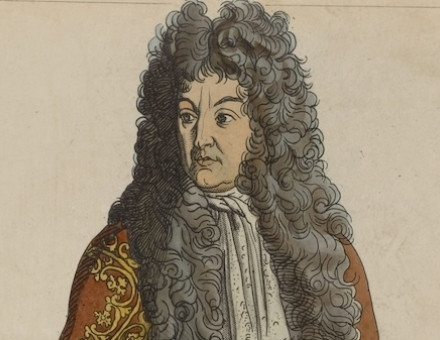A Patriot For Whom? Benedict Arnold and the Loyalists
The dilemmas of allegiance posed for Americans by the outbreak of war with the British crown led Benedict Arnold, 'the most brilliant soldier of the Continental Army’, into the Loyalist camp.
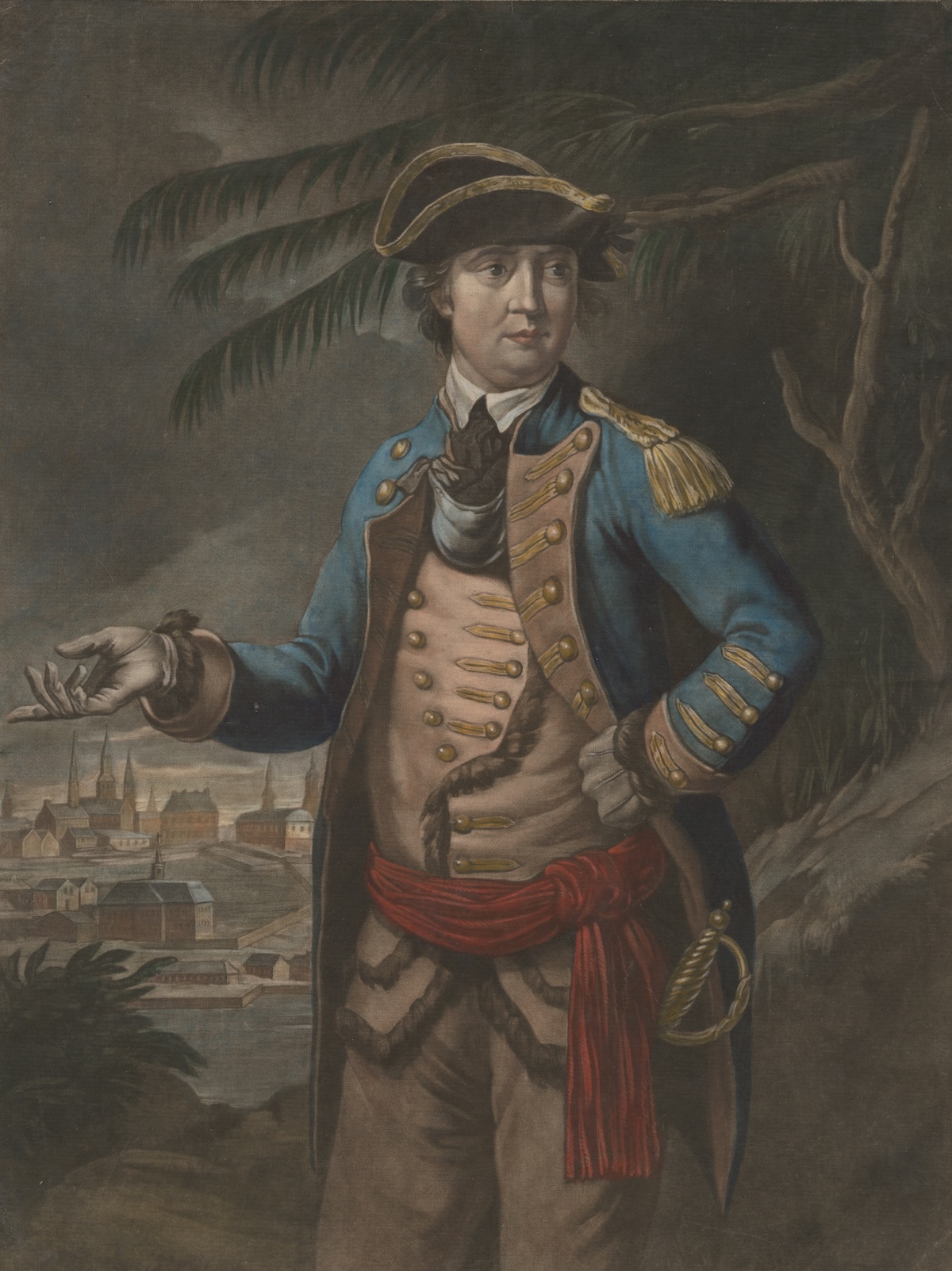
In 1776 no less than one in five of all North Americans (including almost all Canadians) stayed loyal to George III (and in so far as many of them refused to take an oath of allegiance to the new regime, when required to do so, state by state, they were traitors to that state, if not yet to the non-existent 'nation'). At least 19,000 Americans enlisted in the King's service; at one time or another, there were fifty-six Loyalist units or 'associations' organised, though very rarely at full strength (and with many repeat enlistments). At least twenty-one of these units took the field with an average strength of a few hundred men each. General Howe on landing at Staten Island, in July 1776, was swamped by the numbers of volunteers, and the King's American Regiment went on to play a major role in British military history. By 1780 the 'Provincial Line' had a strength of 10,000. Eighty thousand Loyalists emigrated in or by 1783, and over 5,000 as 'the American sufferers', filed claims with the British Government, for losses of land, homes and jobs. The exile of the Loyalists was more significant in the American story (twenty-four emigrés per 1,000 of the population) than was the migration of the emigrés from France in and after 1789 (five per 1,000).
Indeed, a year before, only a minority of the specially-summoned illegal Continental Congress that met in Philadelphia advocated actual separation, and thus behaved as traitors. Many Scottish Highlanders who had fought for Bonnie Prince Charlie against George II's forces in 1745-46 were, thirty years later, fighting in the pine-barren country of the Carolina's for the grandson of that same George II; neither in Scotland nor in North Carolina would they accept Whiggism, or control from a remote capital, whether London or Edinburgh, New Bern or Wilmington. Were they traitors twice over? The most out-spoken republican in North America, Tom Paine, was a restless English immigrant who had only been there eighteen months.
The Loyalists included, of course, many of the 'Establishment' in each colony, but by no means all. 'Classes' and groups, like families, were split. C.H. Van Tyne, in his Loyalist study written as long ago as 1902, listed the Loyalists by categories somewhat baldly. They were, he said:
...office-holders, whose income was at stake... Those gregarious persons whose friends were among the official class... Anglican clergymen, many of whom had motives similar to those of the Crown officials... Conservative people of all classes, who glided easily in the old channels... 'Dynastic' Tories who believed in kings... 'Legality' Tories whose dogma was 'Fear God and Honor the King'... 'Factional' Tories whose actions were determined by family, friends and feuds and old political animosities.
It is clear that such categorisation needs and can now be given much sharper definition. Indeed, if there is one new generalisation that can be risked, it is that the Loyalists came from no particular class and from no one region; they were not just 'notables, but a cross-section of the population, as indeed they must have been if they numbered 20 per cent. When, in June 1776, a number of people were arrested in New York on suspicion of plotting to kill George Washington, they included the Mayor of New York, and some officials, but also farmers, tavern-keepers, two gunsmiths, two doctors, two tanners, one silversmith, one saddler, one shoemaker, 'a pensioner with one arm', and an unfortunate man described only as 'a damned rascal'. When an Act of Banishment was passed against 300 Loyalists in Massachusetts in 1778, one-third of them were described as merchants or professional men and gentlemen, but another one-third were farmers, and the rest artisans, labourers and small shopkeepers. In June 1778 Delaware listed forty-six Tories to whom it refused to give a general pardon. They included two captains, three physicians, one lawyer, and seven described as assembly men, office-holders and wealthy citizens. But the list also included nine husbandmen, two yeomen, two innkeepers, three pilots, three shallop men, two mariners, two labourers, three coopers and one weaver, one coppersmith, one tailor, one saddler, one bricklayer, one hatter and one cordwainer. When the transport ship The Union sailed from Huntington, Long Island on April 11th, 1783, with a group of Loyalists mainly from Connecticut, bound first for New York, then for the St John River, over half were 'farmers', quite a few 'shoemakers', and a number were 'carpenters'. Most of those who settled in Canada were poor, and signed their names with a cross.
In this confused and divided society, there were many groups and many thousands of individuals who could see no America to be loyal to: loyalty, treason and betrayal were in the eye of the beholder. The rules were: keep your head down and sauve qui peut.
The Indians, wandering over extensive territories and – thanks to the greed of American settlers – denied their rights to much land that they deemed their own, were loyal to tribe and chief only. Some of them, however, notably the Mohawks west of Albany, were conspicuously loyal to Britain, thanks to the skill and largesse of Sir William Johnson in Johnson Hall; in their barbarous fashion they were outstanding in their bravery, and in Joseph Brant (Thayendaneg) they provided one of the most devoted of Loyalist leaders. Nor are 'treason' or 'loyalty' useful terms for the 30,000 German mercenaries, sent 3,000 miles from home 'to keep the past upon its throne'.
Even among the avowed patriot heroes, quite a few were in essence, if not mercenaries, then certainly soldiers of adventure, though they might often voice the fashionable language of liberty. Their numbers included the young, rich and spoilt aristo, Lafayette, though he may have converted himself as the years passed; Friedrich Von Steuben, who had been one of Frederick the Great's captains, but, passing himself off as General and Baron, drilled the raw and hungry troops in the bitter snow of Valley Forge and, despite his German, made disciplined soldiers out of them; the Poles, Thaddeus Kosciuszko, a genuine Polish patriot, and Casimir Pulaski, a fame-and-fortune seeker killed in action at Savannah, were each driven out of their own country when it was being destroyed by partition; and the able Johann de Kalb, another self-styled Baron, a Bavarian in French service, primarily seeking to discover if his patron, the Comte de Broglie, would be needed to take over the American command, but losing his life in action at Camden.
Through his years as minister in Paris, Franklin was besieged by many such applicants seeking to join the American service, as often for disloyalty or disaffection with Europe as with dedication to the new cause. And at sea, where there were as many pirates as regular crews and as many privateers as commissioned ships, and where deserters often out-numbered enlisted men, only the rough-and-ready check of spoken accents was taken as evidence of nationality; there were as yet no recognised international rules of citizenship or nationality, and if they had existed, they could rarely have been enforced. Right of search offered very rough justice. In any case, the British government took the view that anyone, soldier or sailor, taken in arms against it, was not a prisoner-of-war but a rebel – just as Lincoln in 1861 saw the Southern cause not as a nation struggling to be born but simply as a domestic rebellion.
The confusion in 1776 was also geographic. Only New York City was firmly British from Howe's landing in July 1776 until the end; erratically, but only for short periods, so were Charleston, Savannah and Philadelphia. If much of New England and of the south were consistently more Patriot than Loyal, all areas swung with the fortunes of war. By 1779 patches of the south were partisan, and from the Santee and Pee Dee country came in the end leaders who made disciplined corps of men who were farmers by day and Patriots by night, so that Francis Marion, Andrew Pickens and Thomas Sumter are names of leaders who became legends. It was not so of the arc of land ringing New York City from south-western Connecticut and Long Island Sound to the Bronx, Westchester and north-eastern New Jersey. Here, as elsewhere, both sides sent out raiding parties and patrols. But alongside them were bandits and desperadoes, familiarly the 'Cowboys' and the 'Skinners'. There former were glorified cattle-stealers, the so-called Lower Party and – if loyal at all – more loyal to America than Britain; the Skinners, the Upper Party, were the reverse. Together, they made of the eastern bank of the middle Hudson a No Man's Land, and, as Major Andre would discover, they lived by indiscriminate robbery, and were loyal only to their own pocket-books.
The only guide to loyalty and treason in the years of the war is to examine individuals. Few of these are as easy to categorise as Tom Paine, the restless 'Mr International Republic' of his day, or the French aristos keen on military experience abroad after the massive French army reorganisation left many of them worried over their professional military careers.
Consider the cases of the two best-qualified professional officers available to command in America in 1775: Charles Lee and Horatio Gates. They each owed their presence in America to George Washington's urging, having been junior officers with him twenty years before during the French and Indian War, in Braddock's ill-fated expedition to attack and capture Fort Duquesne (Pittsburgh). When they were retired on half-pay, Washington invited them over, out of friendship and kindness, to settle in Berkeley County – long before he had any idea of the likelihood of there being a war between Mother Country and colony. Gates had retired on half-pay mainly because he came to the view that at home, in a class-conscious army, in which senior officers' commissions were expensive to purchase, he had – as a house-keeper's son – no chance of winning his just deserts, or any plaudits.
In 1775 Gates responded to Washington's call to serve as Adjutant-General in the Continental Army, served in the Canadian campaign, and, alongside Arnold, at Saratoga in 1777. There will always be debate about the precise part played by each of them in securing Burgoyne's surrender. Perhaps it was mainly due not to their skills or to Burgoyne's braggadocio, but to the facts of geography: over-stretched supply lines, the difficulties of heavily-burdened troops contending with jungle and forest war, with boulders and torrents in their path, with Indian scalping parties and sharp- shooters picking off stragglers and officers, and with wolves prowling among the corpses. Certainly what was clear, after Burgoyne rejected Gates' call for unconditional surrender, was the struggle in Gates between his awareness, as a British officer, of the high cost in lives to both sides if he again resumed an offensive, and his wish to win the battle and perhaps end the war.
As with Howe and with Clinton, his experience bred all-but-total indecision: many a general, in many a war, is similarly reluctant to see his men go to unnecessary slaughter. What emerged was a capitulation, and since Burgoyne would not agree to the use of that term, it became a 'convention'. No one knew precisely what protection or status that gave those who surrendered, and indeed half the Brunswickers on their march to prison-camp in Charlottesville, Virginia, deserted as they marched through the German-speaking parts of Pennsylvania, and never went home. At Camden in 1780 Gates hesitated again, and rode off headlong in retreat. He had been aware of, though probably innocent of collusion in, the Conway plot to replace Washington as Commander-in-Chief. For him it was, however, an inglorious war.
Charles Lee is a case in kind, though by contrast headstrong and quarrelsome, profane in speech and slovenly in habits. Not for nothing had he been given his Mohawk name, Qunewaterike, or 'Boiling Water', on his adoption by the tribe when he 'married' the daughter of a Seneca chief. Before settling down on the banks of the Shenandoah in Berkeley County in 1774, as a half-pay retired British officer, he had seen service as a general in Poland and the Baltic. He had an experience of battle that was rare in north America in 1775, and he was articulate, even eloquent. He was appointed the second major-general in the Continental Army, and had he had longer residence, would probably have been preferred to Washington as Commander-in-Chief. He got a credit he little merited for the defence of Charleston in 1776.
Like Gates, Lee too was critical of Washington's seeming lack of vigour. ('Entre nous', he wrote, 'a certain great man is damnably deficient'.) When captured by the British at Basking Ridge, December 1776, he readily passed over to them information on American troop movements and intentions, as a god above the battle. Exchanged in April 1778, he rejoined Washington at Valley Forge, but in pursuing the retreating British on their withdrawal from Philadelphia, he refused to attack their rear-guards at Monmouth Court House, arguing – again like Gates - that American troops could not stand up to the bayonets of British regulars and German mercenaries. It was easier to be an Adjutant-General than a field officer. He was court-martialled, as much for disrespect to the Commander-in-Chief as for disobeying orders, and dismissed from the service. He had in fact been of no aid to the American cause. He died in Philadelphia in 1782, in poverty and unmourned, victim of his own busy-body self-centredness.
The lesson thus far? Do not trust the mercenary or the 'foreigner' too far; use him but never in top command, whatever experience or knowledge he brings, and however easily he speaks your language; he is loyal in the end only to himself, for his first law in war is survival. But this is the basic assumption of all intelligence training. In one sense, the War of American Independence was easier for intelligence operations: there was no, or a very tiny, language problem, and no need for the use of foreign-language specialists. In fact, British intelligence was skilful in the war, and in Paris outstandingly well-informed. Britain did not lose the war because of any failure of intelligence.
Compared to all of these, Benedict Arnold is a hero. He was probably the ablest fighting commander in either army, and in all he did was devoid of the hesitations and doubts that marked so many of his countrymen in these years. In action, he led from the front, or if in the rear, as at Valcour Island, he was there because that was where the action was; and he was twice seriously wounded. His is a simpler tale than many others, for this was no doubter, and not a man in quest of answers to constitutional or philosophic questions.
Benedict Arnold was well-connected: a great-grandfather of the same name was a governor of Rhode Island in the seventeenth century. As a youngster he twice ran away from home to fight in the French and Indian War; in 1755, he became a successful druggist, merchant and trader in New Haven, who sold horses and probably smuggled on the side; questions were raised early on about his business methods, and they haunted him always. He was always careless of detail, but he was happily married and father of three sons. He looked a leader, with strikingly dark features and pale-grey eyes. He was bold – which some called arrogant; quick to conceive plans and to execute them – which to some spelt impetuous.
In 1775 he joined his militia within ten days of the news of Lexington, and went off to capture the cannon, at lightly-garrisoned Fort Ticonderoga, at the juncture where Lake George meets Lake Champlain. While Ethan Allen at the head of the Green Mountain Boys was loudly claiming the role of conquering leader in the exercise (he ordered the British garrison to surrender, he said modestly 'In the name of the Great Jehovah and the Continental Congress'), Arnold took his men over 100 miles north. He went by boat to the northern end of Lake Champlain, and then direct north to capture Fort St John's. From Congress he got neither the recognition he sought, nor even his expenses from Massachusetts which sent him; indeed, the Continental Congress 'investigated' him; and in his absence his wife died.
Despite this reaction – the first but not the last sign of Congressional disapproval, he proposed to Commander-in-Chief Washington a plan for the invasion of Canada. It emerged as a two-pronged exercise: old and ailing Schuyler and dashing Irishman Richard Montgomery, with the Massachusetts militia, were to move up the open and familiar route of Lake George and Lake Champlain, and capture Montreal. Arnold was charged to attempt an untracked route up the Kennebec river in whale-boats and then to follow the Dead River portages and move down the Chaudière through the forests of Maine to Quebec. He led 1,100 volunteers (who included Daniel Morgan and his Virginian riflemen, and, as an 'unattached volunteer', Aaron Burr, already a student of intrigue and treachery) through snow-storms and swollen streams on a grim forty-five days march, during which they were reduced to eating pet dogs and gnawing mocassins; there were many losses and desertions, and one column gave up and went home. But by mid-November he got 700 gaunt men across the mile-wide St Lawrence and encamped on the Plains of Abraham below the fortress city where Montgomery joined him in December. However embroidered it became in the re-telling and in legend, the 350-mile-long wilderness march on Quebec is an epic tale.
In the joint attack on Quebec in a blinding snow-storm on December 31st, and with fewer troops than the besieged garrison, Montgomery was killed, and Arnold badly wounded in the right knee. He kept the siege going, though himself in a hospital bed. As spring 1776 brought the thaw, and British naval reinforcements reached the St Lawrence, he began the retreat, back to Montreal and down the lakes. Canada was lost for good; the British invasion route into New York lay open again. But even the retreat was brilliantly conducted; ships were built to contest Carleton's attacks and at Valcour Island, in October 1776, Arnold showed himself as skilful and dashing as on land. Only Arnold stood between the British and a drive on New York in 1776 that would have cut the northern states in two, and probably have ended the war. As it was, the invasion was held up for a year. His reward came, almost predictably; when in February 1777 Congress promoted five brigadiers to be major generals, Arnold's name was not among them – and once again his accounts were probed. Only Washington's pleas held him back from resigning; eighteen months' hard fighting had won him no recognition. He won advancement only after a third campaign, in rebutting the British invasion of Connecticut, at Danbury and Norwalk, in 1777.
Burgoyne's belated drive down the lakes and down the Hudson saw Arnold again in action, alongside Gates. Now the news of his approach was a weapon in itself – it induced panic among the Mohawks, as at Fort Stanwix. He fought at Freeman's Farm and Saratoga, and again was wounded. Ironically, the Congressional approval that came now brought him a new job: commander-in-residence in Philadelphia, after Howe's retreat from it, in June 1778.
This brought a new temptation; her name was Peggy Shippen and she was nineteen. She was one of the belles of a Philadelphia society that was still heady after its flirtations with a group of handsome British officers. He married her (he was now thirty-eight) in April 1779, built a splendid home and estate, Mount Pleasant, on the Schuylkill, used army labour in doing so, traded on the side, and was heavily in debt. Some of his merchant-contracts, like crockery dealer Joseph Stansbury, traded as regularly with the British as the Americans, and passed on gossip and information as well as goods. He was a friend of John Odell, Episcopalian Loyalist turned British agent.
The charges and rumour mounted: peculation, shortage of ready cash, contempt for civilian authority, greed for sequestrated Loyalist land and – more creditably perhaps, as one who had been brought up on the constant threat of French and Indian Wars – anger at the new alliance with the once-despotic and still Catholic and Bourbon enemy. Even at the time of his marriage, he was awaiting a court-martial to clear his name of many charges: use of troops, as slave labour for himself; closing shops to troops while bringing in supplies for himself; the too-narrow line he repeatedly drew between meum and tuum ; on two charges he was officially reprimanded by the Commander-in-Chief. Within a month of his marriage he was in correspondence with Sir Henry Clinton and Major John Andre (Howe's Adjutant-General), he passed as 'Mr Moore', conveying information, particularly on French ships and supplies; there seems no reason now to doubt that his wife was aware of his treachery, encouraged it, and may even have suggested it. A year later, he was, at his own request, posted to the command at West Point, the strongest artillery post on the Hudson, and central to the defence of New York.
It is easy to apportion blame: to stress that the 'tone' of Philadelphia society was, on his arrival, still 'British', and that Howe's staff had lived lives so comfortable and gracious that it was natural to seek to emulate them; that some of the Shippens were Loyalist – but of which family in America could this not be said?'; and Edward, Peggy's father, was Loyalist in sympathy. The fault, if fault it was, one suspects, was deep in the man, rooted in his ambition and in the contrast of outstanding success in war and the consequent social flattery it brought, with his failure to win the public plaudits he sought until it was too late. He said himself, in justification to Lord George Germain, that he was actually converted to the British cause. William Smith, the Loyalist, then a refugee living in New York City and one of his intermediaries in the West Point treason, argued that Arnold thought his surrender, and the loss of the fort, would be so dramatic a turning point that it would induce a number of other surrenders, notably of Washington himself, who was (so Smith hinted) to be rewarded by an Irish peerage. Then, as now, rumours of 'honours' could be used as bait, whatever the source. In fact, the only thing that went wrong with his elaborate plan was luck. He might perhaps have thought that an appropriate comment on his whole career.
Arnold met Andre, disguised as 'Mr John Anderson' on September 21st, 1780, at the home of Joshua Hett Smith near King's Ferry, between the British and American lines. Hett Smith was William Smith's youngest brother – and, as it happened, a Patriot. Arnold would come over himself for £10,000; to surrender West Point he asked for a further £10,000. By the time Andre set off to return to the British ship Vulture , which had brought him upstream, it had had to drop down river when fired on. He then dressed himself in civilian clothes (in disobedience to Clinton's orders), and was thus a 'spy'. Following a circuitous route overland in which he became bewildered, he was caught by freebooting 'Cowboys', moving loosely between American and British outposts. Arnold's pass had got him through the American pickets, but in No Man's Land anything could happen. He was in civilian rig, but claimed to be a British officer.
The commander of the American post to which Andre was taken at North Castle, Lieutenant Colonel John Jameson, reported his capture to Arnold, but reported also that incriminating papers 'of a very dangerous tendency' had been found on him (and the papers had been found in his stockings). They revealed the size of the garrison at West Point and vicinity, the outline of artillery deployment and of the ordnance on hand, and an estimate of the forces needed to garrison it. They had been sent, by Colonel Jameson, to Washington as the Commander-in-Chief who, as it happened, was on his way to inspect the fort. Had the papers gone back directly to Arnold, presumably no harm would have been done; his treachery might then never have come to light, or – like Bancroft's in Paris – not until after his death. As it was, Arnold fled, as the Commander-in-Chief was expected at any moment, and joined the Vulture, leaving his wife in hysterics, to act as best she could the role of hostess to a distinguished but, now, shattered and miserable guest. Andre was court-martialled (the Board that tried him included the impeccable and honourable names of Lafayette, Von Steuben, Henry Knox and Nathaniel Greene), found guilty of being a spy, and promptly executed on October 2nd, 1780. On occasion Washington could be unyielding – and decisive.
Arnold lost his reputation, but kept his skill. He was sent by the British on savage, and marrauding expeditions in Virginia and – to stage a diversion from the imminent events at Yorktown in 1781 – on an equally savage raid into his native Connecticut, where he burnt New London, fifteen miles from his birthplace. He put out a broadside, vindicating himself, and appealing to the American army to follow his example. It was, in fact, largely written by William Smith from Arnold's notes, but all to no avail. In December 1781 he sailed with wife and son, for England. He failed to get there the high military commands he craved. His commercial ventures in Canada and the West Indies failed also. He now knew poverty of pocket, and poverty of spirit; in Canada he fathered an illegitimate son. Despite Peggy's pleas to Clinton and the Government for an adequate reward, he got in fact £6,315, and empty lands in Canada. He died, a broken man, in London, in June 1801.
Peggy Arnold died three years later, aged forty-four, loyal to him to the end. She paid off all his debts, but on her single visit to Philadelphia was made unwelcome. Their four sons served in the British Army, one of them becoming a Lieutenant-General. A grandson, William Traill Arnold, was killed in 1855 at Sebastopol, and a great-grandson, Theodore Stephenson Arnold, was a Major-General in World War I. The Loyalist Edward Shippen, her father, worked his passage back to acceptance. In 1799 he became chief justice of his state, Pennsylvania.
Was Benedict Arnold a hero or a traitor, and if a traitor, to whom? He was clearly the bravest and the most successful of the battle commanders, on either side. In promptly joining the rebel cause in 1775, he was a traitor to Britain, as were Washington and Jefferson, Franklin and Paine. In 1780 Arnold could, as he claimed, be purging the original treachery, and even, by the drama of it, be ensuring an end to a civil war.
In the confusion of civil wars – in medieval and early-modern Britain, in the stormy decade of 1775 to 1787 in north America, and again in 1861 to 1865, only capacity to endure and survive, and to use force successfully, resolved the contentions. Many of the Loyalists, in all their hesitations, and in all their intellectual and constitutional wrestlings of conscience, were at least as honourable as Washington. They have been called men without a country. Theirs was a greater tragedy: they were men of two countries, uncertain which was home. Some of them, the more scholarly, have been called Whig Loyalists. So was John Dickinson, who did not end as Loyalist, but hesitated too long to ensure winning that place in American history that he might have had – and which Jefferson did secure. Robert E. Lee, a century later, in putting loyalty to his state before loyalty to the Union, was as honourable as Abraham Lincoln, and more so perhaps than Ulysses Grant, who still held slaves?
The verdict turns not on words like 'treason' or 'loyalty' (which since Senator McCarthy's antics in the 1950s have become an over-worked and loose political currency) but on victory on the field – 'the highest tribunal – arms – that man can resort to...', in Grant's words. If it succeeds, none dare call it treason. The verdict – 1066, 1485, 1689, 1745 in British history, 1781 and 1865 in American – is confirmed only in retrospect, by history. It was Chesterton who said that all historians are snobs: they are pre-occupied with, and seek to justify, success. In history, as in life, it is victory that brings the rewards and the plaudits. Arnold called it simply luck. He, like many Loyalists, just guessed wrong, in 1781, if not in 1776. Gradually, history will slowly erase the memories of those defeated – unless they leave (and safely bury) their memorials.
The Loyalists have been pretty effectively excluded (until recent revivals) from the telling of the American story. At one point, textbooks that told their story were banned from the public schools. The word 'Patriot' was annexed by the victors, and with many of the legends: Revere's ride (thanks to Longfellow's verse), Washington's crossing the Delaware (thanks to Leutze's painting), Nathan Hale's execution, but much less frequently Andre's; Benjamin Franklin's skill and blarney as diplomat, but not his son's loyalty, nor his and his wife's suffering. At least in Benjamin West's painting of the diplomats at Paris in 1782, he left spaces for the British team, even though they did not 'sit'. Stalin did it differently: he simply had Trotsky's portrait erased, along with his role.
There is a monument on the battlefield at Saratoga. It is shaped as a boot, in recognition of a severe leg injury and 'in memory of the most brilliant soldier of the Continental Army'. It records no name.

